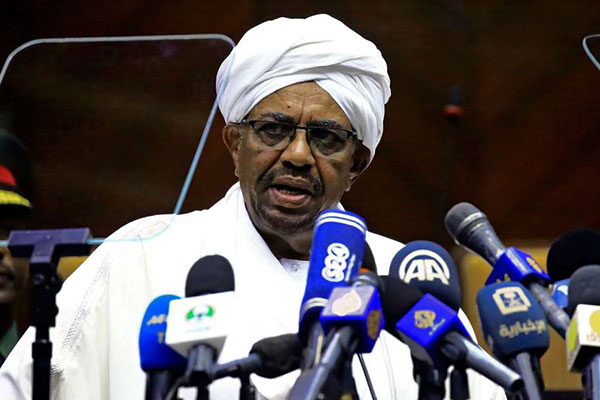President Omar al-Bashir has ordered the closure of 13 Sudanese overseas missions and job cuts at the foreign ministry due to an economic crisis in his country, state media reported Thursday.
Bashir’s order comes days after he fired foreign minister Ibrahim Ghandour after he said Sudanese diplomats abroad had not been paid for months.
“President Omar al-Bashir issued a decree ordering the closing of 13 Sudanese diplomatic missions,” the official SUNA news agency reported early Thursday, quoting the decree.
It did not name which missions were to be shuttered.
The president also ordered seven other missions to reduce their diplomatic staff to just one person, and a broader 20 percent cut to administrative staff at all missions, SUNA reported.
“The decisions have been taken in order to cut costs given the economic situation in the country,” the decree said, according to SUNA.
Bashir’s order in addition included the dismissal of the entirety of the administrative staff at the foreign ministry, with diplomats taking over their duties, the agency reported.
There were no figures on how many job cuts were to take place in total.
Economic crisis
Sudan has been facing financial difficulties amid an acute shortage of hard foreign currency that has seen the African country’s economic crisis worsen.
Ghandour had been the first official to portray a grim picture of the country’s economic woes publicly when he told parliament in April that for months Sudanese diplomats had not been paid and many wanted to return to Khartoum.
Bashir sacked him a day later on April 19.
Sudan has been hit hard by an acute shortage of foreign currency that has seen the pound plunging against the dollar, forcing the central bank to devalue it twice since January.
Expectations of a quick economic revival had been high after Washington lifted a trade embargo.
But officials say the situation has not changed at all as international banks continue to be wary of doing business with Sudanese banks.
Sudan’s overall economy was hit particularly hard after the south separated from the north in 2011, taking with it about 75 per cent of oil earnings.
A surging inflation rate of about 56 per cent, regular fuel shortages and rising prices of food items have triggered sporadic anti-government protests in Khartoum and some other towns.



